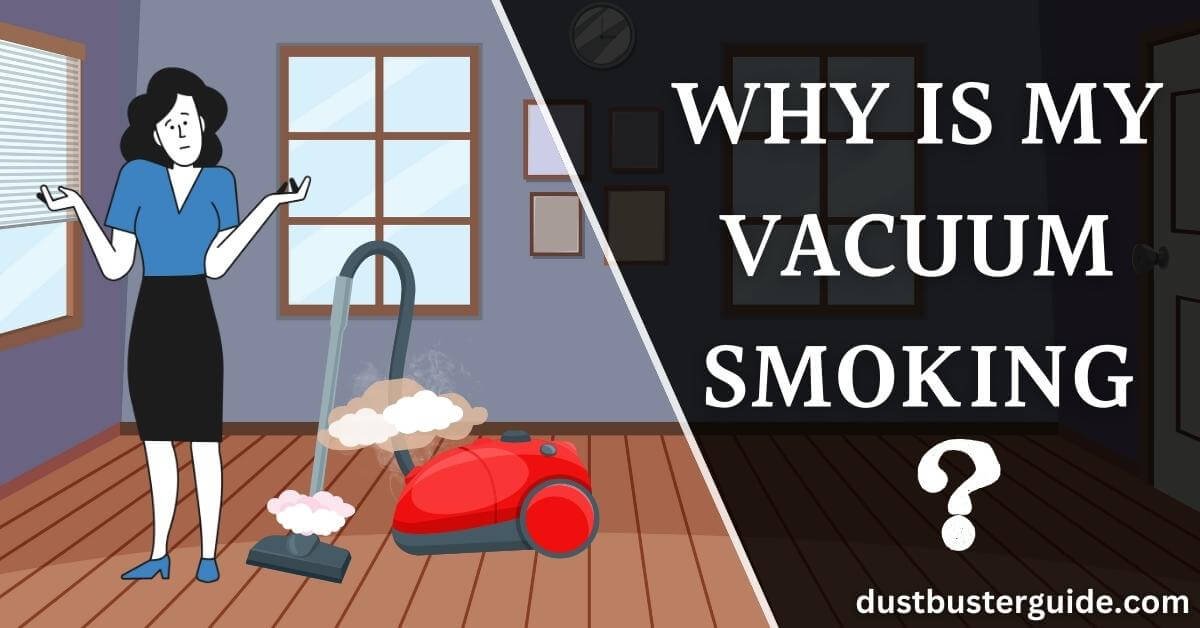Ever caught your vacuum putting on an unexpected performance, complete with smoke signals, and wondered, why is my vacuum smoking? Today, we’re diving into the mystery behind this unexpected act. Picture this: your cleaning companion taking on a role it wasn’t cast for.
But before you hit the panic button, here’s the scoop – a smoking vacuum is often a sign of trouble, usually caused by issues like a clogged filter, a worn-out motor, or overheating. Join us on this troubleshooting journey as we decipher the smoke signals, understanding the potential culprits and how to address them.
Get ready to transform your vacuum from a smoke machine back into the trusty cleaning hero it’s meant to be!
6 Main Reasons Why Does Vacuum Smells Like Burning
Before you assume that your vacuum is completely useless and run out to buy a new one, consider the following reasons for a vacuum cleaner emitting smoke or odors, such as burning electrical wires or rubber:
- Broken vacuum belt
- Clogged brush rolls or beater brush
- Blocked vacuum hose at the base of the hose
- A faulty or broken brush roller
- Problems with the vacuum’s motor
- The vacuum pump
The Vacuum Belt
Some people ask, why does my vacuum smell like burning rubber? It usually occurs when there is a problem with your vacuum belt. A broken or highly worn belt is one of the most common causes of vacuum smells like burnt rubber. When this happens, turn off the vacuum, unplug the electrical line, and check to see if the belt is still in position and one piece. If so, remove any carpet fibers, hair, or other things preventing the belt from spinning. If the belt is broken, worn, or stretched, you may need to replace it.
Why Does A Vacuum Belt Break?
A vacuum belt breaks because too much hair, string, or cables wrapped around the brush roller will strain the belt and cause it to break if it does not move. Remove the debris regularly if you want to keep the roller running smoothly. Keep in mind that, depending on how frequently you use your vacuum cleaner to clean your home and how old it is, you should replace it every 3 to 12 months.
Clogged Brush Rolls Or Beater Brush
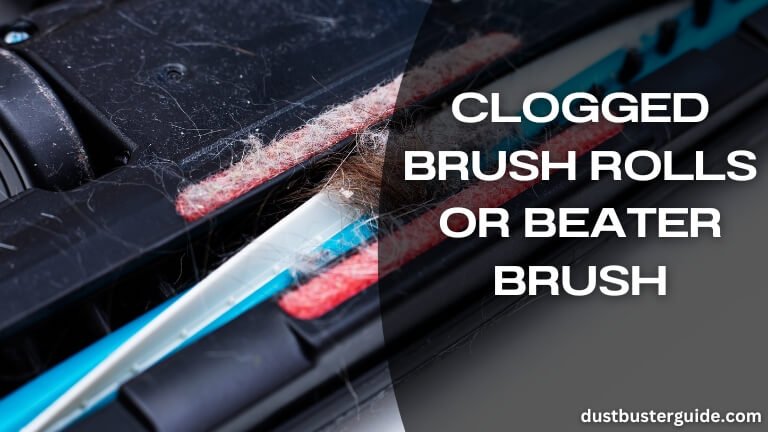
If everything appears to be in order with the belt, but the problem persists, and you continue to wonder, why is my vacuum smoking? know there is a problem with the brush rollers. So the next step is to inspect the brush roller for things lodged between the belt and the roller. When the vacuum cleaner is clogged, it cannot normally perform as efficiently as it should. When there is a problem with a vacuum cleaner, it will either make a screeching sound or emit burning odors.
Blocked Vacuum Hose At The Base Of The Hose
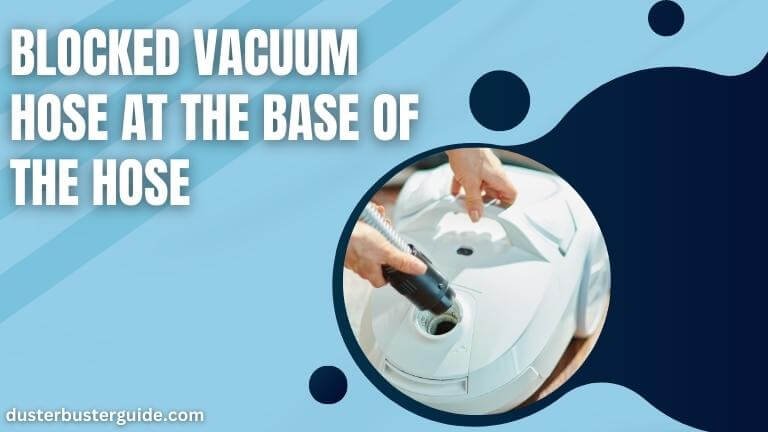
If dust and dirt become trapped between your vacuum cleaner’s hose, filter, and motor, it will begin to burn. And you will know this is the issue you must resolve. So, clean the vacuum hose, paying special attention to the base of the tube leading into the machine.
A Faulty Or Broken Brush Roller
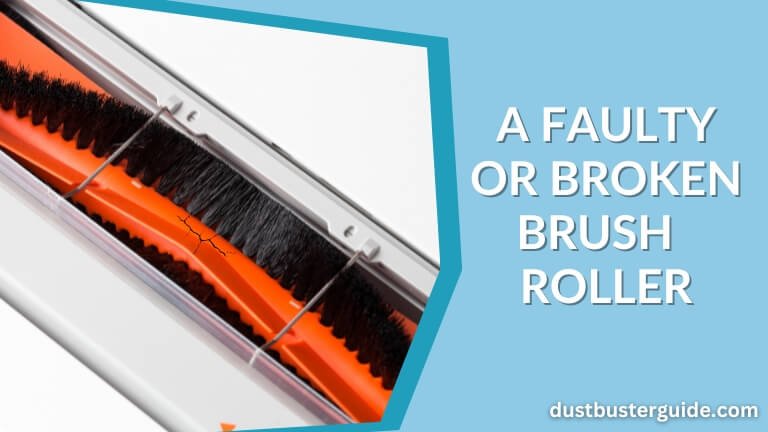
Another reason your vacuum produces smoke or emits a burning smell is the troubled brush rollers. A malfunctioning or broken brush roller on a vacuum cleaner will make your vacuum cleaner suffer. For example, a burning scent from a Hoover vacuum is usually caused by a faulty brush roller. If the roller is no longer spinning you can see that the brush roller’s bristles have worn out or fractured from debris that has coiled itself around it. Replace the brush roller yourself or with the assistance of an authorized vacuum repair dealer.
Problems With The Vacuum’s Motor
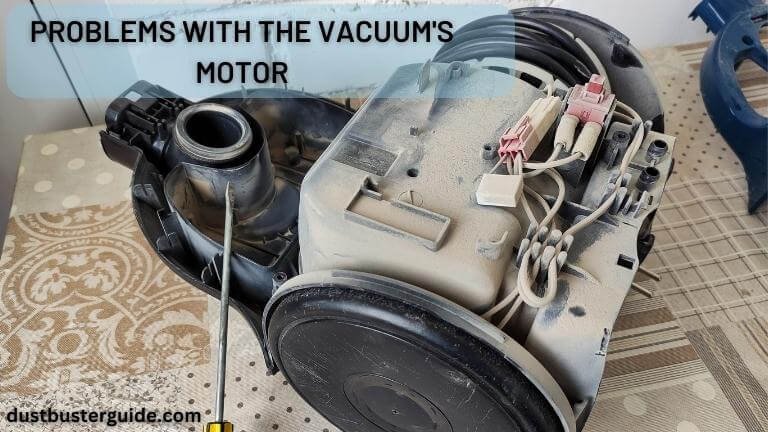
It can be the biggest reason your vacuum produces smoke most of the time. A Dyson vacuum with a burning odor and popping sounds is an example of a motor malfunction.
If the location of the burning smell or smoke is not so evident to you and you know that you have checked all other parts of the vacuum cleaner such as the brush roller, belt, and vacuum hose, but your concern is still the same that why is my vacuum smoking, the fault may then be with the motor.
An overworked motor will typically show signs of overheating, become hot to the touch, and shut off automatically. When the engine of an older vacuum cleaner begins to burn out, you may notice the scent of burnt plastic or wires. It is time to have the engine inspected by a qualified technician.
The first step in determining what to do if your vacuum is smoking is completely turning it off. Check the belt and the brush roller, and if both are in excellent order, check the vacuum hose and the motor. If the motor is to blame, it is recommended to have it checked and fixed by a reputable vacuum cleaner repair company.
The Vacuum Pump
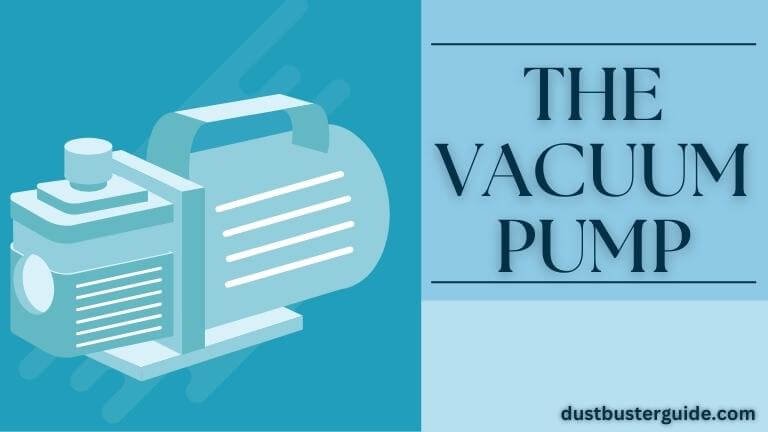
It is the portion that most people overlook. In many cases, the smoke you perceive is mechanical pump oil vapor. Many people believe there is something wrong with the unit anytime there is smoke from the pump. However, oil vapor or oil mist is a natural byproduct of establishing a vacuum in an oil-sealed mechanical pump. There is no need to be afraid if you observe this type of vapor because the pump emits it in a specific chamber from the atmosphere.
Some vacuum pump designs have an internal oil mist separator within the exhaust cavity. It normally remains shut with a cover plate. This component is constructed of a fibrous substance that absorbs moisture as oil runs through it. The more oil flows through this portion; the more likely smoke will be produced when the pump operates at full power.
Why Is My Vacuum Smoking (What To Do?)
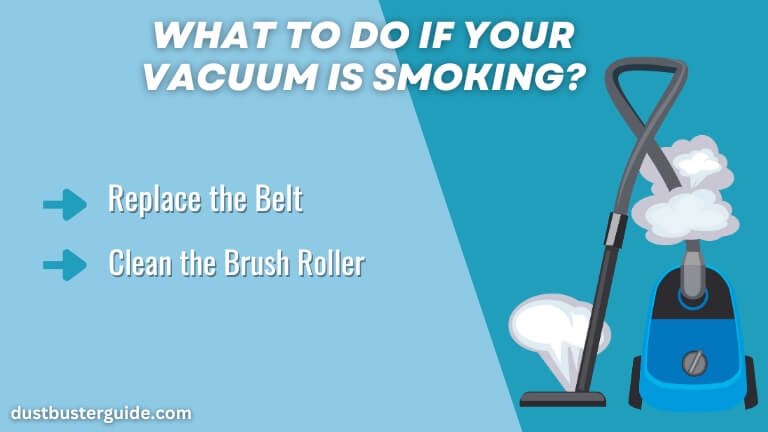
Once you’ve found the reason or the areas that helped you uncover the answer to your inquiry why is my vacuum smoking, you may move on to solving the problem. In general, you may quickly repair a smoking vacuum cleaner by just replacing the belt and cleaning the brush roller, as these are where most problems occur. So, let’s see how we may complete this task:
- Replace the Belt
- Clean the Brush Roller
Replace The Belt
If you see that your vacuum belt is damaged, you must replace it. Make sure to purchase a replacement belt based on your vacuum’s make and model number. Once you’ve received the replacement belt, you can change it by following the user manual’s directions or have a professional repair service do it for you.
How To Replace The Belt
To replace the belt on your own, begin by removing the cover. Once you have removed the cover, the belt is easily accessible. In most cases, two shafts hold the belt in place. Consider cutting the old belt off with scissors for simple removal. Stretch the new belt over the new belt buckle. After that, you must clean the brush roller.
Clean The Brush Roller
Now that you’ve replaced the belt, cleaning the brush roller is important since this could be another cause: why does the vacuum smell like burning?
How To Clean The Brush Roller
To clean the brush roller, first, remove it from the vacuum. Cut through hair and dirt with scissors or a cutter, then pull it out with your hand. Replace the brush roller once it has been cleaned. It’s a good idea to clean your brush roller regularly to avoid clogging, which might cause the belt to not rotate properly. Before replacing the cover, spin the brush roller with your hand to ensure the belt is secure.
Once everything is in place, clean the vacuum’s inside components before replacing the cover. So, once you’ve changed the belt and cleaned the brush roller, restart the vacuum and see whether the problem persists. We are sure that the smoking odor will be gone, and your vacuum cleaner will be back to its best and ready to clean your home.
What To Do If My New Vacuum Smells Like Burning?
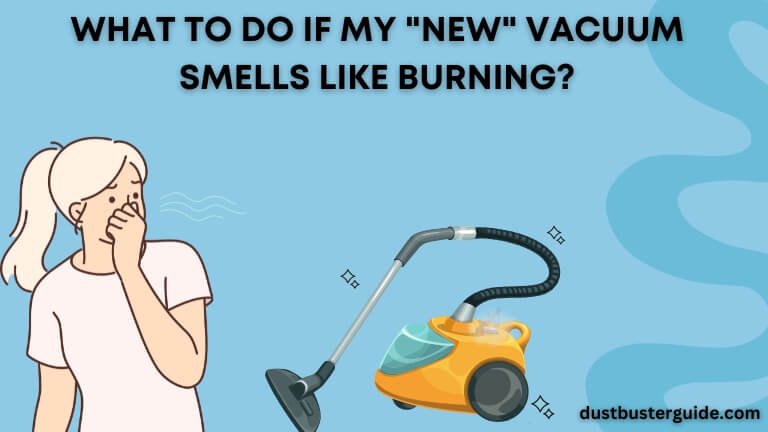
We see that the smoking problem may be due to extensive use, as the belt and brushes are dusty and worn, but what if the same smoking problem occurs with your newly purchased vacuum? So, even if your new vacuum smells like burning, here is what causes the problem:
- Check for smoke.
- Check to see if the wall plug or cable is hot.
- Check if the hair got tangled in the vacuum’s brush roll.
Check For Smoke
Your new vacuum is smoking due to a variety of factors. A lighted cigarette end is smoking inside the bag or has been sucked into the appliance, the drive belt is stuck, or the electric motor is running too hot.
Check To See If The Wall Plug Or Cable Is Hot
A hot wall plug or wire is frequently the result of an overworked motor. It also indicates a faulty connection between the mains and the suction cable. To resolve the issue, check whether the cable wires are too tight in the plug terminals.
How To Restore And Repair A Vacuum Cleaner Power Cord
If the plug remains hot, check for a tight fit between the socket and the plug. You can also plug the vacuum into a different socket to diagnose the problem or hire an electrician.
Check If The Hair Got Tangled In The Vacuum’s Brush Roll
Hair wrapped around the rotary brush ends and drawn near the bearings might generate a burning smell. You must remove the hair since the friction against it emits a burning odor.
How To Prevent The Vacuum From Smoking
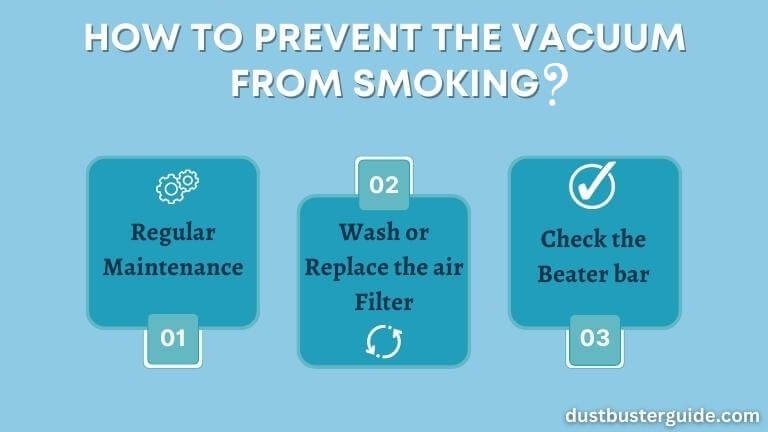
So we now know why is my vacuum smoking and how to fix it. Don’t you think it would be fantastic if you could prevent it from happening in the first place? So, we’ve listed some options below that will keep your vacuum from smoking, so take a look:
Regular maintenance is an easy method to keep your vacuum cleaner in good operating order and prevent it from smoking. Remove hair and trapped debris from the brush roller as often as possible. Before the vacuum bag or canister reaches its maximum capacity, empty it.
Furthermore, wash or replace the air filter at least once a year. Replace the HEPA filter in your vacuum every six to eight months. Simple maintenance goes a long way toward keeping your vacuum cleaner from smoking. Take care of it, and it will look after you.
One more thing to remember, when cleaning, dust, hair, and string can become caught in the beater bar (the spinning piece at the bottom) of the vacuum, causing it to operate slowly and with less suction strength than it should. So, when using your vacuum, always carry it up and flip it over to check the beater bar for any potential clogs that may impair the cleaning and generate the scent because blocked bars can be an issue if not rectified swiftly. After checking, ensure your vacuum cleaner is moving freely; this is an underlying factor that generates the smoke smell.
Why Is My Vacuum Blowing Out Dust?
If your vacuum is blowing out dust instead of effectively capturing it, there are several potential issues that may need attention. Start by checking the condition of the filters; dirty or clogged filters can hinder the vacuum’s ability to trap dust. Regularly clean or replace filters based on the manufacturer’s recommendations. Ensure that the vacuum bag or bin is not full, as an overloaded container can lead to dust escaping during operation. Inspect seals and gaskets for any damage or wear, as leaks in these components can compromise the vacuum’s efficiency.
Thoroughly clean the dust bin or bag compartment to prevent residual dust from being stirred up during vacuuming. Check hoses and air passages for clogs or blockages that may disrupt airflow, causing dust to escape. Examine the brushes or rollers on the vacuum head for signs of wear or damage; worn components may not effectively agitate and lift dust from surfaces. Adjust the vacuum height setting to the appropriate level for the flooring type to prevent dust kick-up. Lastly, ensure that seals in the dust bin or bag compartment are intact and functioning correctly to prevent dust leakage.
Conclusion
Finally, this article answers your question: why is my vacuum smoking? Since you now know that all smoking vacuum problems are caused by the belt and brush rollers, you can easily replace and clean them. It’s also a good idea to clean and maintain your vacuum cleaner regularly to keep it from smoking in the first place.
FAQs
Why does my vacuum smell like it’s burning?
The exhaust filter of your vacuum can become blocked, causing the motor to overheat. If the vacuum cleaner smells burnt, you should examine the exhaust filter. It is typically found on the top or back of the unit, near where the exhaust air exits.
What should you do if your vacuum smells like burning?
The vacuum belt could be clogged or damaged. Turn off and unplug your vacuum cleaner and inspect the belt to see if it is broken or if a string, carpet fiber, or hair is stuck in it, preventing the belt from moving the brush roller.
How can I tell if my vacuum cleaner is overheating?
You should investigate if your vacuum cleaner is producing weird noises, smoking, or generating burning scents. These are indications that your vacuum cleaner is overheating and nearing the end of its useful life.
How can I prevent my vacuum from overheating?
If something becomes stuck in the hose in another section of the system, the airflow is restricted, which might lead to overheating and shutting down. Remove hair, dirt, or debris from hoses, attachments, and brushes. It should restore airflow and get things back on track.
Why did my vacuum quit working all of a sudden?
Ensure the vacuum cleaner is plugged into an available power outlet and that no fuses or breakers need a reset. The second most likely source of the problem is a triggered thermal cut-out caused by a blockage.
Why did my vacuum quit working all of a sudden?
Ensure the vacuum cleaner is plugged into an available power outlet and that no fuses or breakers need a reset. The second most likely source of the problem is a triggered thermal cut-out caused by a blockage.
How do you get rid of bad smells coming from vacuum cleaner exhausts?
Eliminate bad vacuum smells by regularly cleaning filters, emptying the dustbin, and wiping down the vacuum. Additionally, use odor-absorbing materials like baking soda on filters or in the dustbin.
External Resources
- Suck Up The Mess: The Benefits Of Using A Car Vacuum Cleaner – 91Wheels
- Design And Development Of A Low Cost Handheld Vacuum Cleaner – ResearchGate
Assessment Of Vacuum Cleaners And Vacuum Cleaner Bags Recommended For Allergic Subjects – ScienceDirect - Microbial Contents Of Vacuum Cleaner Bag Dust And Emitted Bioaerosols And Their Implications For Human Exposure Indoors – ASM Journal Platform

